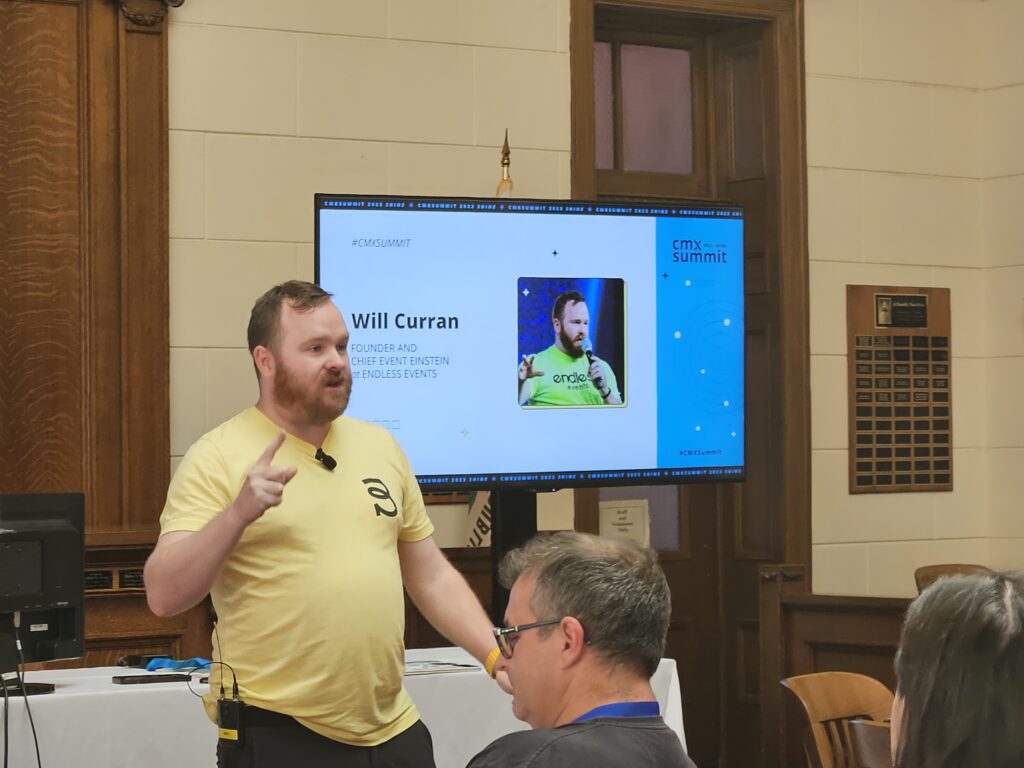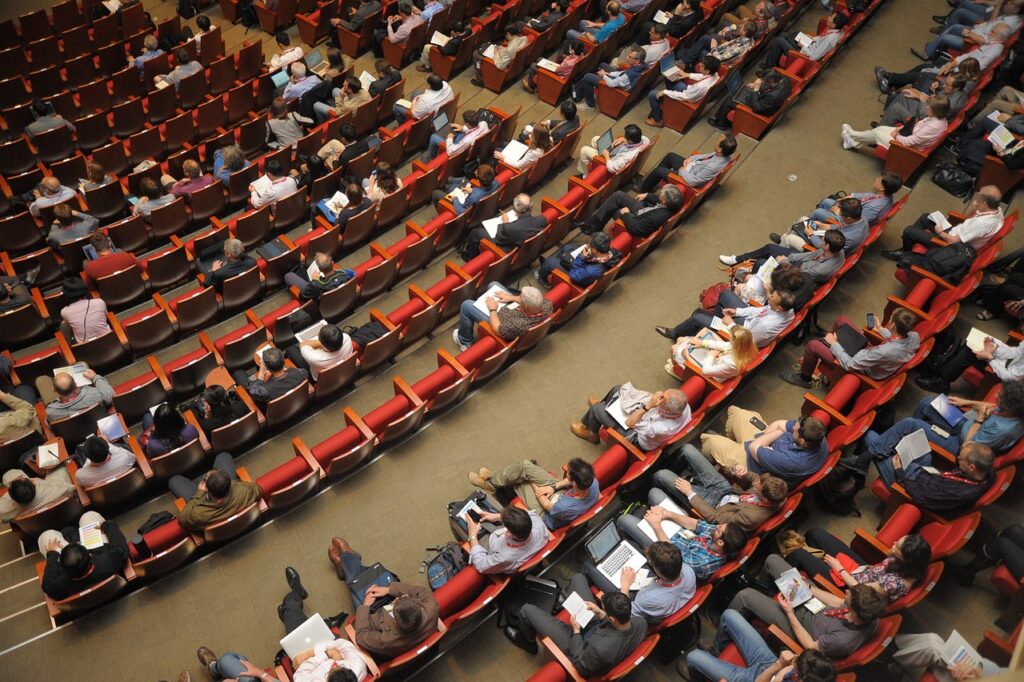A couple of weeks ago, I attended the CMX Summit, a conference in Silicon Valley for professional Community Managers, to see what broadcasters could discover. While I learned a ton about community building, perhaps the session that I attended that was most immediately relevant to radio broadcasters was given by somebody who hosts in-person events.
Will Curran knows the live event production industry. Over sixteen years ago, he founded Endless Events, an event management company that has worked with clients like Uber, Anheiser Busch, and Warner Brothers. In 2020, he became the Community Manager for the #EventProfs Community, a group of thousands of event production professionals. Today, he is the Head of Klik for Bizzabo (there’s a Silicon Valley job title if I’ve ever heard one!), where he oversees his company’s flagship wearable B2B tech. Will also speaks at conferences across the country about event strategy.

Will’s session at the CMX Summit focused on the event trends he is seeing as we head into 2024. If I could sum it up in a sentence, I would quote a line from the beginning of Will’s presentation:
“Stop trying to do events like it’s 2019.”
Given the audience that he was addressing, Will’s focus was primarily on B2B events like conferences, not necessarily the concert festivals and other B2C events that radio stations tend to be involved in. Nonetheless, there’s a lot to be learned, so let’s take a closer look at some of the trends that Will discussed in his presentations:
1. Demand for virtual events is declining…with one exception.
Not surprisingly, now that the COVID-19 pandemic has passed, we’re all tired of sitting in front of our computers to attend 8-hour virtual events. After years of self-isolation, people are craving human interaction. As a result, in-person events are higher in demand than ever, while virtual events are seeing a steep drop in demand…
…with one exception: Webinars. Will said that he is still seeing a strong interest in attending short educational virtual events, just not full-blown virtual events that try to emulate the experience of a day-long conference.
This falls in line with my contention that virtual events should be seen as a supplement to in-person events, not a substitute. Continue to host your big annual in-person event, but supplement it with short, monthly virtual events that keep you on the top of people’s minds all year long.
Will did note that he has seen a shift in the relationship between in-person and virtual spaces. It used to be that people met for the first time at in-person events, then looked to the web (Facebook groups, Slack channels, etc.) to continue those relationships. Now, he says, people are starting those relationships online and looking to in-person events to meet IRL and deepen them.
2. Less content, more networking
In fact, Will argues that these relationships are the main reason why people are interested in events these days. This is different from the past, Will argues, when the main driver for people to attend events was the knowledge that they could gain from the presentations. Today, people can gain that knowledge anywhere thanks to the the internet, so the ability to make in-person connections has become the primary incentive for B2B event attendees.

In practical terms, this means that event producers need to consciously create spaces for event attendees to connect with one another. Sometimes, that’s as simple as providing spaces for people to sit and talk. Or it can be more elaborate, such as organizing moderated discussion groups known as Braindates. (I led a Braindate on the topic of community building at Podcast Movement this year and it was a fantastic experience.)
3. Community
“Community is 100% the answer,” declared Will. Because people are looking to in-person events to make connections with others, one of the best things an event producer can do is provide attendees with the tools to develop those connections. This means pairing in-person events with virtual spaces where attendees can further strengthen their connections. These spaces can include asynchronous platforms, such as Facebook Groups, Slack channels, or Discord servers, as well as real-time virtual events, such as Zoom meetups.
4. Data
Like every other industry, event producers have fallen in love with data. This is particularly true in the wake of the pandemic, when virtual events provided event producers with tons of data to sift through. Now that we’ve returned to in-person events, data is a bit harder to capture, but it’s still just as important.
Will scoffed at the idea that a post-event survey (which only a fraction of your attendees are going to fill out) can provide you with the data you need to continue producing a successful event. Today, event producers are focused on upping their data capture game.
Fortunately, community can help with this. Will argued that if you have systems in place to collect data from your community ahead of time, event organizers can use that data to create a program that will attract attendees.
Will also pointed out that capturing the right data can make it much easier for event producer to resign sponsors for the following year. It’s one thing to be able to tell as sponsor, “X people attended this year,” but quite another to be able to say, “You signed up X new customers at our event.” If you’ve can capture the right data, Will says, “exhibitors are going to be begging to come to your event.”
Of course, the most important data point you can capture as an event producer is the same as it is in every other industry: ROI.
5. Artificial Intelligence
Will argues that A.I. is making in-person events more important than ever. Why? Artificial intelligence is going to produce such a flood of content that in order to cut through, companies will need to create spaces where communities can form. Events are great spaces to nurture communities.
Like many of us, Will has started using A.I. to generate the first draft of his event-related content, such as session descriptions. However, he thinks a human always needs to review and revise this content.

6. Diversity
Event producers are aiming to make their events more diverse to attract a wider audience. Sometimes, this means making sure that the speakers on stage represent a wide range of backgrounds. But this can also mean making sure that the event is accessible to a wide range of attendees, including those who have different physical needs and people who are neurodivergent.
7. Last Minute Registration
 More and more, Will is seeing a increase in last-minute registrations for events. This always makes event producers a little twitchy, but it’s a reality that needs to be factored into their thinking. (Side note: Former radio programmer Jacent Jackson, who joined me at the CMX Summit, registered the night before.)
More and more, Will is seeing a increase in last-minute registrations for events. This always makes event producers a little twitchy, but it’s a reality that needs to be factored into their thinking. (Side note: Former radio programmer Jacent Jackson, who joined me at the CMX Summit, registered the night before.)
8. Sustainability
Event producers are in the business of creating ephemeral engagements, so naturally they tend to create a lot of trash from disposable materials. (C’mon, do you really keep everything in that swag bag you get at the registration desk?) This is bad for the environment, so event producers are increasingly looking for more sustainable ways to do things. This can mean creating a mobile app for the event instead of a printed guide, or cutting back on giving away unnecessary trinkets.
Stop Producing Events Like It’s 2019
The COVID-19 pandemic wreaked havoc on the event industry, but event producers have emerged from the global health crisis with new tools and a new mindset. Even though we have seen a number of commercial and public radio industry conferences cease operations this year, Will believes that the demand for in-person events is higher than ever. But to succeed, event organizers will need to understand that the way to produce successful events has evolved.
- A Simple Digital Treat to Thank Your Radio Listeners This Thanksgiving - November 13, 2023
- Interview Questions When Hiring Your Radio Station’s Next Digital Marketing Manager - November 6, 2023
- A Radio Conversation with ChatGPT: Part 2 – Promotions - October 30, 2023





Leave a Reply